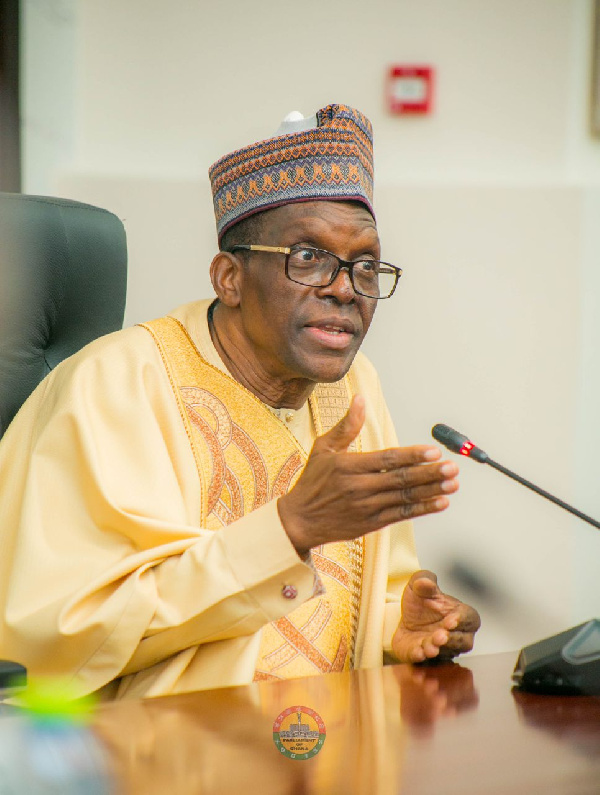Speaker of Parliament Alban Sumana Kingsford Bagbin has cautioned strongly against the increasing clamour for a military regime in the country, indicating that the consequences were dire and counterproductive.
Instead, he said the nation must come together in the spirit of unity and development to reform the 30-year-old multi-party democratic system to align with the development aspirations of the people.
He maintained that it was better to acknowledge the flaws in the current political system and correct it to maintain multi-party democracy, which he said was the best for the world.
“Because there is nowhere on the world that has developed through any other system apart from a democratic system. So, that is why usually after the military regime or dictatorship, we come back to it,” he said.
Speaker Bagbin made the admonition when he called on Osabarimba Kwesi Atta II, the Oguaamanhen, as part of activities to celebrate 30 years of uninterrupted parliamentary democracy under Ghana’s Fourth Republic.
The Speaker was accompanied by Mr Cassiel Ato Forson, Minority Leader of Parliament and his deputy, Mr Emmanuel Armah Kofi Buah; Madam Kate Addo, Director of Public Affairs of Parliament; Madam Rosemary Arthur Sarkodie, Parliamentary Procedural Clerk, Mr Kweku George Ricketts-Hagan among other leaders of Parliament.
Other dignitaries at the meeting also included Mrs Justina Marigold Assan, the Central Regional Minister, some of Members of Parliament (MPs) of the Central Region and chiefs and queens of the Oguaa Traditional Council.
The anniversary, among other things, seeks to enlighten the public on the role of parliament and allow MPs to confer with citizens on how to improve the political system.
Mr Bagbin attributed the calls for military rule and military takeovers in the past to the lack of understanding of parliamentary democracy, a situation he noted had been taken for granted.
Such lack of appreciation, he averred, was responsible for the recent coups d’état in Mali, Burkina Faso, Chad, Niger and other parts of Africa.
In view of that, he said it was critical for Parliament to reach out to the people to help them appreciate the system to restore confidence.
The Speaker observed, for instance, that many young people saw Parliament as an avenue to enrich themselves while citizens were enraged by MPs’ resources for work and consider it a waste of money.
But Mr Bagbin dismissed that notion, saying, “I don’t know which MP has left Parliament better than they came.”
He also raised questions about the dilemma of whether MPs should listen to their political parties or their constituents when making decisions in Parliament.
In his view, it was worrying that political parties held sway over MPs and controlled them in their interest rather than the interest of the people.
Similarly, he expressed disquiet over how a lot of people voted on party lines instead of the quality of representation.
He also expressed concerns over the low representation on women and the youth in Parliament as well as the utter lack of representation of some vulnerable and minority groups such as differently abled persons.
He added that the country must reconsider the exclusion of chiefs in politics given the critical role they played in development.
Citing countries like Botswana, Malawi, and Eswatini, he said Ghana would be in a better place if chiefs were given a direct role in the democratic governance.
For Ghana to develop, Mr Bagbin also argued that the country must develop its language, indicating that no country had ever developed using a foreign language.
He observed that South Africa and countries in East Africa were fast developing because they had developed and leveraged Swahili as a common language.
The Speaker also called on the citizenry to bury all forms of differences, see themselves as one people and work concertedly to develop Ghana.
Osabarimba Kwesi Atta, for his part, stressed the need for Ghana to be wary of Western manipulation and adopt indigenous ways to expedite meaningful development.
After the meeting, the Oguaamanhen gifted the Speaker a colourful Kente and a beautiful model of a crab, the symbol the Oguaaman.
In return the Speaker gifted the Omanhen a golden plaque of the Parliament House.
Source: gna.org.gh




